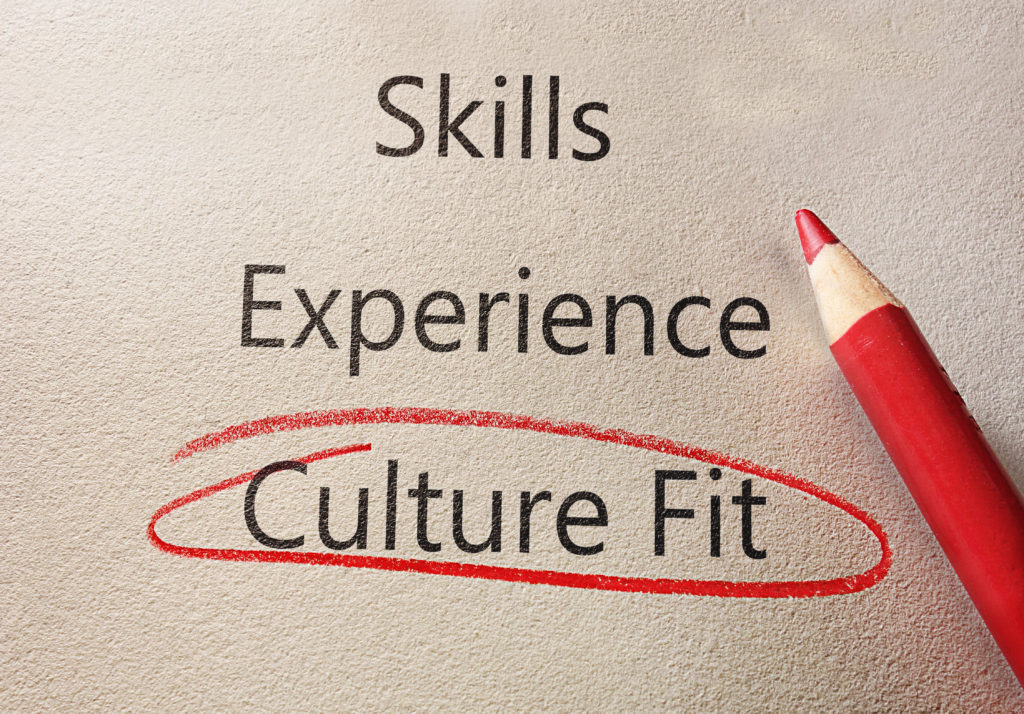Your company values reflect every aspect of your business, from how you deal with customers to how you treat employees. These things form your workplace culture and the types of employees who can succeed working for your business. Some companies have their cultural values written down in an unified document, for some they are left unwritten. Either way, company culture exists even when not written down or they can be different in reality.
It’s therefore important to find employees whose values align with your actual company values. The right cultural fit questions will help you determine how someone could fit into your workplace culture and benefit your business long term. Let’s dive into the topic in this blog article where you can also find some example questions on different aspects of the culture.

What is cultural fit?
Before someone works with you, you need to know not just what their skills are, but how those skills could impact your business. Asking culture-fit interview questions helps you find out if someone would be a good fit for your workplace culture. Of course, it is important to have the right skills, but when you have shared values among the collective, it increases motivation, retention and reduces the risk of conflict.
Cultural fit comes down to a candidate’s values, beliefs, attitudes, and behaviours aligning with your business’s.
For example, if you value collaboration, you should look for candidates who have examples of collaboration from previous roles or whose mindset reflects someone who’d be open to this way of working. For example, someone who prefers working alone will struggle in a business with a work style that’s all about collaboration and has a lot of meetings. Or someone who only works well in an office will have a hard time adjusting to working in a home setting.
What is culture add?
If someone adheres to your culture too strictly, you’re at risk of groupthink, which can be detrimental to your diversity, equity, and inclusion policies. Instead, when assessing someone’s skills and mindset, look at what they could add to your culture, too.
Culture add means that someone embodies the same core values as you, without the strict adherence that can lead to groupthink, less creative thinking, and a lower feeling of belonging for all employees.
Instead, they’ll increase your company’s diversity, fostering more creative problem-solving and enhancing your workplace culture.
There’s no such thing as a right or wrong company culture. Every business, like every person, is unique. That means every business requires a different group of people and ways of thinking to be a success.
It’s unlikely you’ll find an employee who ticks every box culturally, therefore it’s important to assess someone’s mindset and attitude alongside their existing skills. This will help you see what skills, if any, someone has or is willing to learn.
Why is it important that your candidate fits your culture?
In a recent study, Gallup found that 55% of Millennials are disengaged at work. This is higher than any other generation. Disengagement can come from not feeling connected to roles, or the company’s purpose. Culture fit helps to reduce this employee disengagement within your business.
As a result, employees are more likely to enjoy their work, be more productive, and stay for longer. This saves you money in hiring costs, allowing you to invest in upskilling/reskilling existing employees instead, keeping their industry knowledge in-house and helping you grow faster.
Regardless of the rank you’re hiring for, you should check the cultural fit of all candidates. This ensures higher employee engagement at every level of your business.
How to assess your candidate’s cultural fit in an interview
Asking the right questions will help you determine how someone works and if they’re a good fit for your business.
Assessing your candidate’s cultural fit isn’t just about what their answers to your questions are. How they answer your questions is just as important. The language someone uses when they speak tells you a lot about their mindset and what they could be like to work with.
Comparing their soft skills to what already exists within your business will help you see where they could add to your existing culture.
However, you want to make sure that there isn’t a huge disconnect. For example, someone with a fixed mindset won’t be a great fit for a business that’s all about a growth mindset and learning from mistakes.
Best interview questions to determine culture fit
Here are some examples of the questions that will help you determine if someone is a good cultural fit for your company culture:
Motivation
- What motivates you at work?
- What excites you at work?
- How would you motivate a colleague who’s struggling with a task?
Management
- What’s your leadership style?
- How could a manager best support you?
- What management style motivates you?
Teamwork
- Are you more of a leader or a follower?
- Do you prefer to work alone or in a team?
- What’s your preferred method of communication? (Email, Slack, calls, etc.)
Mindset
- What blogs or websites do you regularly read?
- What type of learner are you? (Kinaesthetic, visual, etc)
- How do you give/respond to critique?
- What does work/life balance mean to you?
Time and project management
- How do you stay organised?
- How do you prioritise tasks when you have multiple deadlines?
- How do you handle tight deadlines?
- Can you describe a time when you showed initiative at work?
- Can you give an example of when you solved a challenge at work? What was the outcome?
Company values
- How would you describe our company values?
- Which of our company values do you most/least relate to?
- What appealed to you about this role?

Cultural fit red flags
When assessing someone’s cultural fit, it’s important to keep an eye out for red flags. These may look like:
- Bad-mouthing their previous employer. If someone spends too long bad-mouthing a past employer, instead of talking about how they could help you, it shows a negative attitude. They’re likely to bring this to work with them and drag their colleagues down, negatively impacting employee morale and productivity.
- Getting defensive. If they get defensive when you ask them certain questions, or you challenge their answers, it could suggest that they’re not open to feedback/criticism, which could inhibit their ability to grow in the role.
Conclusion
When someone’s a good cultural fit, they add to the team, helping improve your workplace culture and work environment. Asking interview questions to assess culture fit will help you hire someone who’s a good fit for your organisation’s culture.
To assess if someone is a good cultural fit, you should ask a variety of questions that help you analyse their mindset, attitudes, ways of working and feelings about work.
Teamdash – The all-in-one recruitment software.
Streamline your recruitment process, save up to 70% of your time and hire top talent fast.

